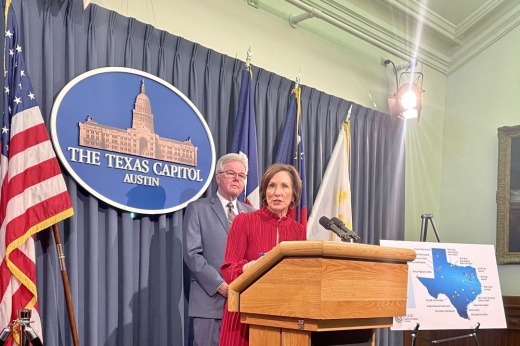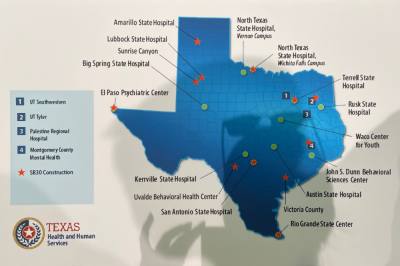At a press conference, Patrick announced a $2.3 billion investment to increase mental health care capacity across Texas. The money will come from the state’s $32.7 billion budget surplus.
Patrick called the plan “the biggest package on mental health care ever designed in the United States.”
The context
Kolkhorst said mental health needs have increased significantly in Texas since the beginning of the COVID-19 pandemic, especially for adolescents.
Before the pandemic, approximately 1,000 Texans were on waitlists for forensic hospital beds, Kolkhorst said. Forensic mental health wards assess and treat people who have mental illnesses and are in the criminal justice system. Since the pandemic, Kolkhost said the waitlist for forensic beds has “exploded to nearly 2,500.”
From rural Texas to big cities, “our jails have become the place where people with [mental health] issues are, because we don’t have enough places for that,” Patrick said.
Many state hospitals, state-supported living centers and local mental health facilities are also facing staffing issues.
The plan
To help improve mental health care for Texans and take some pressure off of local jails, the Texas Senate has proposed a $2.3 billion investment in the state’s mental health care system. The money will be allocated to the Texas Health and Human Services Commission under Senate Bill 30, a supplemental appropriations bill.
The Texas House passed SB 30, with four amendments, on April 6. The bill will now return to the Senate, which can approve the amended legislation or call a conference committee, where lawmakers from both chambers would hammer out the details.
SB 30 also sets aside the following pots of money for mental health care:
- $4.5 million to plan and acquire land for a new state mental health hospital in the Dallas-Fort Worth area;
- $123 million to build the state hospital in the Dallas-Fort Worth area;
- $9.6 million to create 240 new mental health beds at Austin State Hospital;
- $152 million to create 300 new beds at San Antonio State Hospital;
- $33.6 million to build a new behavioral health campus in Uvalde;
- $23.7 million to address maintenance needs at state hospitals and state supported living centers; and
- $3.1 million to upgrade infrastructure at state hospitals and state supported living centers.
Across the board, Kolkhorst said existing facilities will receive at least 940 new beds.
Another key component of the plan is SB 26, by Kolkhorst. The bill would create a $15 billion “innovation grant” program to help local mental health centers provide early intervention and treatment for children and their families.
According to the bill text, grant funds could be used for a variety of initiatives at local facilities, including staff training, family services and more. These services would also be aimed at keeping children with mental health issues from being placed in foster care or sent to a juvenile justice facility.
The bill requires the HHSC to work with state local facilities to provide transition support services for patients after they are discharged from a facility. The transition programs would “help a person in a state hospital to step down gradually [and] make their way to a supportive, safe setting in the community once they leave the hospital," Kolkhorst said.
Local mental and behavioral health centers would also have to undergo regular performance audits, which would be made available to the public online.
“Senate Bill 26 delivers clear direction for several programs funded in the budget to make sure these funds are spent on patients, treatments and beds,” Kolkhorst said. “... The bill creates transparency and accountability for our many community health systems to ensure that services are actually getting to those that need it most.”
Kolkhorst said she expects that Texas will invest “upwards [of] 3.5 billion absolute new dollars” into mental health care.
SB 26 received unanimous approval from the Senate on April 13. It now heads to the House.
“As I traveled rural Texas last year, I listened closely as Texans from all regions of our state explained the need for improved mental health care access,” Patrick said in a statement following the passage of SB 26. “...This investment is a responsible use of our unprecedented budget surplus, and I am proud that the Senate has come together as one to support this important and historic endeavor.”
The Senate also recently passed SB 25, a nursing education bill, with a unanimous vote. The bill would create scholarships, grants and a loan repayment program for nursing students. Patrick said this will help curb staffing issues at mental health facilities across Texas.






